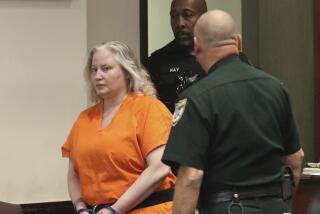Drunk Driver Sentenced, Then Ordered Freed
WESTMINSTER — Saying that he was compelled to act against “common sense,” an Orange County judge Friday ordered the release of a man who was tried and convicted twice for killing a Newport Beach woman in a drunk-driving accident.
Danny David Ornelas, 21, was ordered released because he already has served more than the two-year sentence pronounced Friday after his second conviction in the hit-and-run death of Debbie Killelea, 37, in September, 1988.
Ornelas originally was convicted in 1989 of vehicular manslaughter with gross negligence while intoxicated. He was sentenced to 10 years in prison, the maximum term.
Prosecutors alleged that Ornelas, of Huntington Park, was joy-riding that Labor Day weekend, with a blood-alcohol level of 0.18%--more than twice the current legal limit. They also charged that Ornelas was driving up to 45 m.p.h. in a 15-m.p.h. zone when he hit Killelea, who was walking in an alley with two of her children.
Killelea’s last seconds were captured on a videotape inadvertently shot by Ornelas’ companion.
An appellate court overturned Ornelas’ conviction, saying that Superior Court Judge Luis A. Cardenas erred by not giving jurors proper instructions about lesser offenses. Also, the court disagreed with Cardenas’ reasons for giving Ornelas the maximum sentence: He had cited the defendant’s level of intoxication as one factor.
Prosecutors refiled the charges. On Tuesday, a second jury convicted Ornelas of the lesser offense of vehicular manslaughter while intoxicated--which carries a maximum four-year term.
In handing down the sentence Friday, Cardenas said the appeals court ruling prevented him from considering Ornelas’ level of intoxication as an aggravating factor in “a crime of great violence . . . even though my common sense led me to that conclusion. . . . “
Without an “aggravating factor,” he was unable to impose the maximum penalty.
“My dilemma is a young mother lost her life here, and I think a judge feels under those circumstances that he should look very hard . . . to see if there are aggravating factors,” the judge said.
Even if Cardenas had been able to impose the maximum sentence, he acknowledged that he still would have had to release Ornelas, when time off for good behavior and other credits were factored in.
More to Read
Sign up for Essential California
The most important California stories and recommendations in your inbox every morning.
You may occasionally receive promotional content from the Los Angeles Times.










